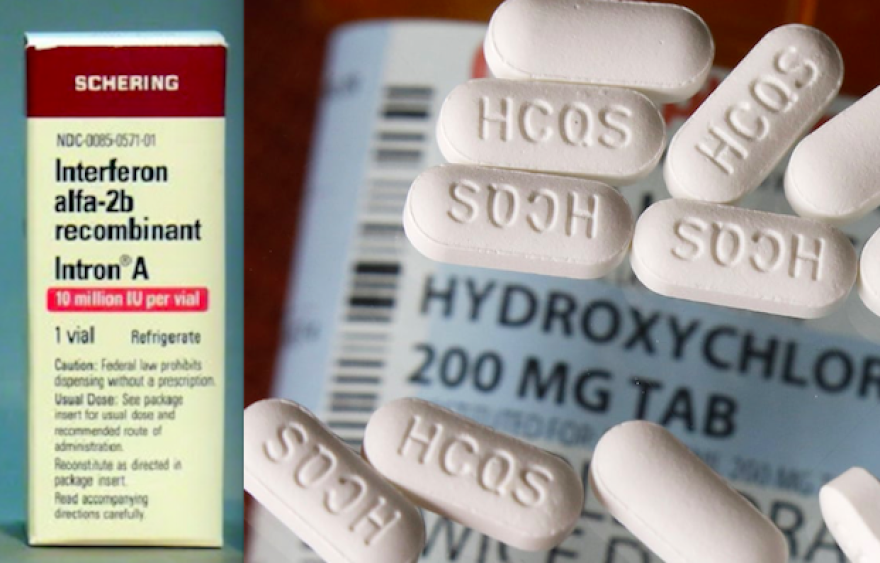In Washington this month, President Trump announced the U.S. had just “bought a tremendous amount of hydroxychloroquine.” That’s the anti-malaria drug he insists is the most promising treatment for the new coronavirus, or COVID-19. "A game-changer,” the conservative leader likes to say.
In Havana, Eduardo Martínez – head of BioCubaFarma, communist Cuba’s state-run biotech and pharmaceutical industry – just as often touts the island’s anti-dengue drug interferon alpha 2B (or alfa 2b), which he and the government insist is a COVID-19 wonder drug.
In these uncertain times, you can rely on WLRN to keep you current on local news and information. Your support is what keeps WLRN strong. Please become a member today. Donate Now. Thank you.
“We’re capable of providing this drug not just in Cuba but around the world during this crisis,” Martínez said recently.
But in Miami, Dr. Dushyantha Jayaweera – an infectious diseases professor at the University of Miami’s Miller School of Medicine who's now working on coronavirus clinical trials – isn’t buying either the conservative or communist claim. “Until studies demonstrate there is clear benefit," Jayaweera says, “you’re just shooting in the dark.”
Meaning he, like most scientists, insists neither hydroxychloroquine nor alpha 2B has been clinically proven effective for treating the coronavirus.
So why are so many folks, including doctors but especially politicians, singing these drugs’ praises? The reason is part pandemic desperation – and part Cold War.
First the desperation.
READ MORE: No Longer Immune? Latin America & Caribbean See Significant Rise in COVID-19 Cases
Last month Rio Giardinieri, a 52-year-old restaurant equipment executive in Miami Shores, believed he was dying from COVID-19 at Joe DiMaggio Children’s Hospital in Hollywood.
“I was at the point breathing was very challenging,” Giardinieri said in a video. “I – I really thought my end was there. "

But then he heard about hydroxychloroquine. A doctor finally authorized it for him – and he recovered, as have a few other coronavirus patients in the U.S. who’ve taken it.
"To me the drug saved my life," Giardinieri said.
Still, researchers really don’t yet know why those patients recovered or if hydroxychloroquine was the actual factor. And Jayaweera at UM says a handful of anecdotes like that does not equal patented science.
“The rationale of using hydroxychloroquine is to decrease the amount of virus in the lungs,” he says, pointing out the drug may also help reduce the coronavirus-induced “cytokine storm,” the immune system’s dangerously overheated reaction to the virus.
“But people just put up things like two patients, three patients get better, and then they say, ‘Oh my God, this works.’ Which is really not true.”
In fact, this month the French research organization (ISAC) that had originally offered a positive assessment of hydroxychloroquine’s potential as a COVID treatment – which Trump and the drug’s other boosters so often cite – backed off it. “Although ISAC recognizes it is important to help the scientific community by publishing new data fast,” it said, “this cannot be at the cost of reducing scientific scrutiny and best practices.”
Scientists (including authors of a recent Brazilian study) also warn about the drug's cardiovascular and other hazardous side effects.
Governments are taking advantage of people's hope to get credit for something that just can't be done right now – namely, curing coronavirus. – Helena Poleo
Jayaweera says he understands that because a coronavirus vaccine looks a long way off, some patients and doctors will reach for anything encouraging. And that’s certainly the case in Latin America – where that anything encouraging right now tends to be Cuba’s interferon alpha 2B.
“I’m aware all the complete clinical studies haven’t been done,” says Dr. Walter Perdomo, mayor of Villanueva, Honduras. “But we have to take some step forward on this.”
Like a lot of local leaders in Latin America, Perdomo is waiting for delivery of alpha 2B. He says Villanueva, a medium-size city of 180,000 people, has reported almost 50 COVID-19 cases – more than a tenth of Honduras’s official total, and 14 COVID-19 deaths – more than a third of the country's total.
A big reason is Villanueva’s migrant traffic. Its first case was a woman who returned last month from Orlando. But another factor is Honduras’ threadbare public health infrastructure.
“In our whole metro area there are barely enough ventilators and intensive-care units for half the cases we have already,” Perdomo told me. “So if you were us, you too would buy Cuba’s drug.”
NO MAGIC SOLUTION
China has reported some success treating COVID-19 patients with interferon alpha 2B. But communist China has a stake in that success: It’s helping its ally Cuba develop the drug. Either way, most scientists also question alpha 2B as a COVID medicine.
“There’s no single clinical trial showing the benefit of interferon [alpha 2b],” says Dr. Alfonso Rodríguez Morales, a Venezuelan who is vice president of the Colombian Association of Infectious Diseases and a leading Latin American epidemiologist.

Rodríguez says interferon alpha 2B may show some anti-viral benefits, such as raising the level of immune system proteins (interferons) that defend against viruses. But even if that's the case, he says, one drug at this point is not the answer.
“We need to focus on combination therapy that includes three or four or even more drugs,” he insists. “There is no magic solution.”
Which brings us to the Cold War.
That magic solution isn’t just a medical goal for many people. It is a political one too – and at the moment it often reflects the animosity between the U.S. and Cuba.
“All of these governments are taking advantage of people’s hope to get credit for something that just cannot be done right now – namely, curing coronavirus,” says Helena Poleo, a Venezuelan-American political consultant and head of Influence Communications in Miami.

Poleo recognizes how Trump supporters like FOX News have exploited stories like Rio Giardinieri’s, not just to promote hydroxychloroquine but the President himself. Trump allies like conservative Florida Gov. Ron DeSantis have also championed the drug.
Poleo feels likewise that Cuba’s interferon alpha 2B push has propaganda in mind as well as patients.
“The Cuban regime has always said that they were better than the rest of the world in their medical research,” Poleo says. “So they’re using this opportunity to push their alleged advances.”
Cuba’s pharmaceutical and biotech sector can claim successes. Two decades ago, for example, the U.S. relaxed its trade embargo against Cuba to let SmithKline import a Cuban meningitis vaccine. But experts say that drug was more reliably vetted than interferon alpha 2B – which outside communist Cuba is being promoted largely by ideologically kindred governments like Venezuela and Ricoleta, Chile, whose mayor, Daniel Jadue, is communist.

Meanwhile, the retro Cold War rhetoric and gestures have sprung up: Cuba scapegoating the U.S. economic embargo for its inability to get alpha 2B more widely tested for the coronavirus; the U.S. urging Italy and other countries hard hit by COVID-19 not to import either alpha 2B or Cuban doctors.
Last week, though, a drug did emerge as a more likely coronavirus treatment: remdesivir. It too needs further testing. But in this case it’s being touted not by conservatives or communists – but by scientists.



